We’ve now completed a third rotation of the Player’s Handbook, meaning that almost every class has had every subclass from that book examined in the Class 101 series! Two classes with lots of subclasses—the cleric and wizard—will need a little extra time to cover. Starting this week, however, we’re moving away from the Player’s Handbook and taking a look at the brand-new subclasses that you’ll find in Tasha’s Cauldron of Everything!
Our next new subclass from Tasha’s is a bard who sings the song that birthed the world, and uses its primordial power to sing life into unloving objects and even create something from nothingness. This subclass is particularly well-suited to dragonborn bards, for it’s said that the dragon gods Bahamut and Tiamat were once the song’s original performers.
Check out the other articles in the Bard 101 series, like the broad overview of the entire class in Bard 101: A Beginner’s Guide to Style and Panache, or the deep dives into specific subclasses in Bard 101: College of Lore, Bard 101: College of Valor and Bard 101: College of Eloquence.
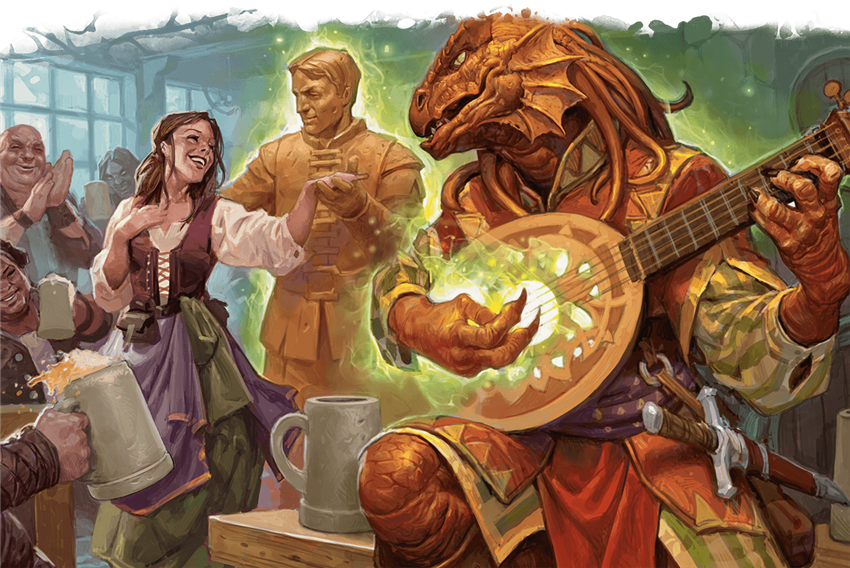
Story of the College of Creation
“Sing with me again, O Platinum Dragon,” sang Tiamat, her five chromatic heads gleaming against the background of the starry cosmos as they sang a discordant harmony.
“O Dragon Queen,” rumbled mighty Bahamut, his bass voice causing the very foundations of the heavens to shudder at their vibrations. “How can we sing together, as we once did, when so much blood has been spilled between us?”
“Sing the Song of Creation, my love,” Tiamat sang, her vast wings spreading across the horizon. “Let us be as we once were—!”
“Oh, no, no! Stop all this!” A silver-scaled dragonborn in the front row stood up and waved his hands. The puppet show before him staggered to a halt, and a dragonborn with copper scales poked his head out from behind the stage’s starry backdrop. His finely-crafted Bahamut and Tiamat puppets, each five feet tall with nearly ten-foot-wide wingspans, fell lifelessly to the ground in a jumbled heap.
“By all five of the Dragon Queen’s heads!” The copper dragonborn struck a despairing pose as he moaned in grandiose sorrow. “What now, my friend? My producer, my greatest ally, why, I ask, do you continue to pull upon the threads of genius?”
“Oh do shut up,” the silver dragonborn groaned. “You, my friend, possess a rare gift, and your mother made me promise to keep you from squandering it. A puppet show in which the great Evil One professes her love to our Benevolent Creator in song is not a worthwhile use of your gift!”
“It—is—art!” the copper-scaled bard bellowed, causing flecks of his own acidic breath to fleck his scaled lips. “You cannot seriously deny the majesty of Tiamat singing five-part vocal harmony with herself!”
“She is an evil goddess and scourge of Avernus, boy!” The producer buried his face in his silver-scaled hands and sighed. “Not some tragic demoiselle!”
“How dare you!” the bard scoffed. He whistled a quick, sliding tune and the Tiamat puppet vanished into thin air, in the exact same moment that a gleaming steel sword materialized in his hand. He bit down on the glove upon his free hand and drew it off, then spat it onto the ground. “I am wounded, sir! I demand satisfaction.”
“Gods’ sakes, take a nap,” the silver dragonborn growled. “You’re grouchy. You’ll whistle a better plot into existence tomorrow morning, anyhow. I’m off.”
“See you for coffee tomorrow?” the bard asked, his scandalized expression snapping into one of hopeful anticipation.
“Coffee tomorrow,” his producer nodded, an exasperated smile on his face as he stepped out the door.
College of Creation Features
When bards gather to share stories and develop new verses, they call their gathering a college. That bond of fellowship can be loosely applied to all bards who follow in a similar tradition. Bards who sing their own unique variations upon the primeval Song of Creation are members of the College of Creation. The bard gains access to four subclass features at 3rd, 6th, and 14th level. You can read all of the College of Creation features in Tasha’s Cauldron of Everything. In summary, your subclass features allow you to:
- Create a mote of potential that enhances your Bardic Inspiration, based on what type of action it is used to boost
- Play the Song of Creation to create a nonmagical object of a certain monetary value or less
- Sing life into an inanimate object, animating it for a short time
- Create more objects than usual, and ignore any gold piece limitations on the cost of the objects you can create
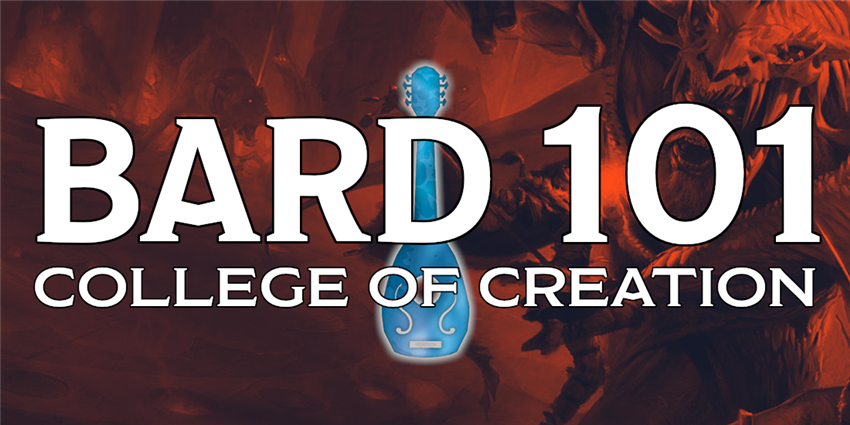
Benefits of the College of Creation
The College of Creation is a highly thematic subclass that instills an almost folkloric feeling of magic into your bard—fitting, given bards’ role as chroniclers and retellers of folk tales. This subclass’s most incredible power is its ability to create objects out of thin air, meaning that its power is limited in scope only by your imagination (as well as a gold piece and size restriction, but even the cost limit disappears by 14th level). If you want to be someone who has a tool to solve any problem, this is the subclass for you. Need to replace a priceless artifact with a well-crafted fake? This has you covered. Need a sword for your party fighter after everyone’s been stripped of their gear and thrown in prison? Say no more. Tack and harness for an unruly warhorse on the eve of battle? You know who to call.
The College of Creation has several other features, too, with fun and creative applications. Being able to sing life into an object and recreate the final scene of Toy Story by scaring a street thug half to death can make for an amazing roleplaying moment. Animating objects can, of course, also create expendable cannon fodder in a frantic battle, which can help draw fire away from your allies. And the Mote of Potential encourages you to use your Bardic Inspiration early and often by making it more useful in unique ways, based on if your ally uses the die on an ability check, a saving throw, or an attack roll.
But most incredible of all, once you reach 14th level, you are no longer restricted by cost on how valuable an item you can create with your Performance of Creation, meaning that you can conjure expensive material components for spells out of thin air. A jeweled bowl for heroes’ feast? Free. A diamond for resurrection? On the house. You get the picture. Use your precious gold pieces on more fun things, like investing in a home base for your characters, buying warships, or bribing corrupt politicians to help you get your way in the royal court.
Drawbacks of the College of Creation
The College of Creation is a coup for people who love the creative, free-form aspects of D&D. If you can dream of a solution to a problem, you can probably will it into existence with this subclass. The only trick is, if you like clear-cut, “solution-in-a-box” spells with obvious mechanical effects, you may not enjoy this subclass’s core features. Animating objects and improving your Bardic Inspiration are fun features, but if you don’t plan on using Performance of Creation as often as possible, you’ll find that this subclass’s other features won’t measure up to more clearly powerful options in the College of Lore and other alternatives.
Still, the bard is a full spellcasting class, and you’ll get tons of spells over the course of your adventuring career. Even if you like all of your powers to have straightforward mechanical effects and ignore Performance of Creation entirely, you’ll have plenty of fun toys to play with from your Spellcasting feature alone.
Suggested Build
Like most classes in D&D, the bard doesn’t choose their subclass until 3rd level. If you’re playing a bard from 1st level and think you want to follow the College of Creation later, you should choose a race that improves your Charisma score and your Dexterity score. However, thanks to the new “Customizing Your Origin” section in Tasha’s Cauldron of Everything, you don’t have to let your character’s race dictate their ability scores; you can reassign your racial ability score bonuses to any score you see fit.
If you’re playing without these new rules, the dark elf and lightfoot halfling races provide useful boosts to Dexterity and Charisma, as well as other useful mechanical bonuses. Half-elves gain a bonus to Charisma and other ability scores of your choice, too. And lastly, the dragonborn race is also thematically appropriate for this subclass—since this subclass has a lore connection to Bahamut and Tiamat—and provides a useful Charisma boost, too.
As a College of Creation bard you should choose EQUIPMENT instead of GOLD while creating your character. Choose a rapier, a diplomat’s pack, any musical instrument of your choice, and leather armor and a dagger. Think about other tools that fit your character’s theme; are you skilled at singing things into the world perfectly formed, or do you keep artisan’s tools on you at all times to fix any errors you may have made while singing objects into existence?
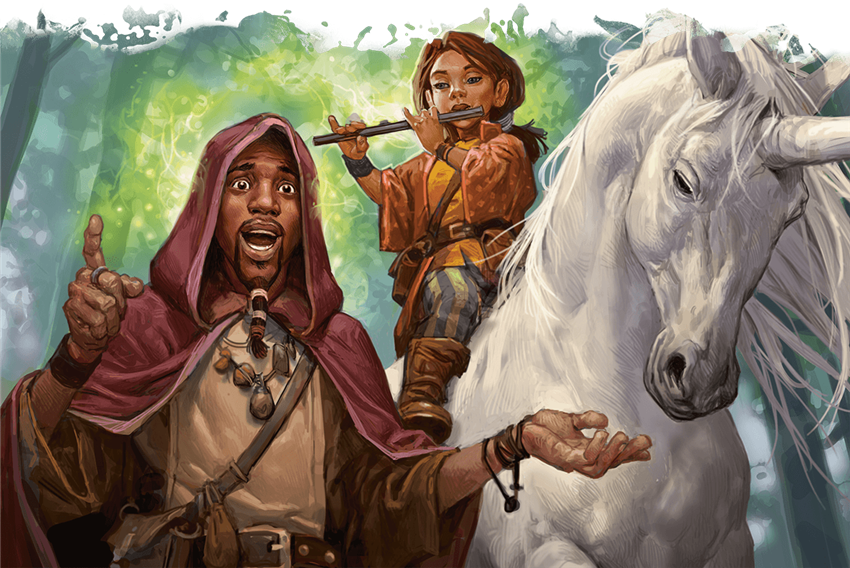
Spells
When you choose your spells at 1st level, you'll be getting the hang of what role you want your bard to play in your party. Unlike some other spellcasting classes, once a bard learns a spell, they know that spell forever. You can "trade out" one known spell for another spell on your spell list when you gain a level, but that's it. You want to have a little bit of everything, and you can pick two cantrips and four 1st-level spells as a 1st-level bard. From there on out, you learn one new bard spell every time you level up (more or less), and can also trade one known spell out, as mentioned above. And that's not even considering the spells you will ultimately gain from your Magical Secrets features. That's a ton of spells, so don't fret too much over the decision.
Since you want a smattering of everything, choose any two cantrips you like (one of them should probably be vicious mockery, since it's so iconic), and four spells from the suggested list below. Try to choose one spell labeled OFFENSE, one spell labeled SUPPORT, one labeled DEFENSE, and two labeled SOCIAL. Note that this list only includes some spells from the Player's Handbook and Tasha’s Cauldron of Everything so if you want to choose more unusual spells, or have other sources like Xanathar's Guide to Everything, you'll have to do a little self-directed research. This list is just here to get you started if this is your first time playing a College of Creation bard.
- Bane (DEFENSE)
- Charm person (SOCIAL)
- Color spray (DEFENSE)
- Cure wounds (SUPPORT)
- Disguise self (SOCIAL)
- Dissonant whispers (OFFENSE)
- Faerie fire (SUPPORT)
- Heroism (SUPPORT)
- Tasha’s hideous laughter (DEFENSE)
- Silent image (SOCIAL)
- Sleep (DEFENSE)
- Thunderwave (OFFENSE)
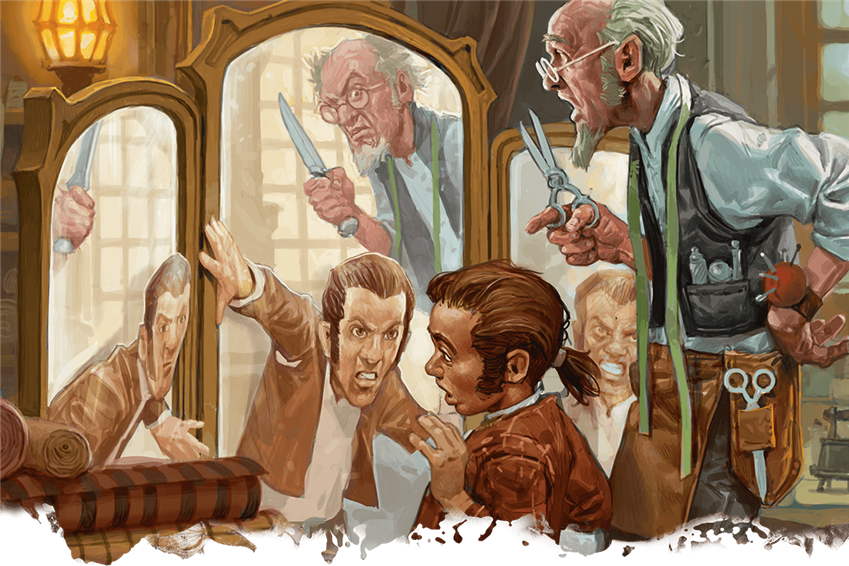
Feats
Once you’ve improved your Charisma score to 18 or 20, you can increase your power with a few useful feats. The following feats are good picks for College of Creation bards, and will improve your reliability in your own desired area of expertise:
Chef. This new feat from Tasha’s Cauldron of Everything is a fun one that turns you into a group healer during short rests. This pairs well with your Song of Rest class feature, and the image of singing a plate full of sweetrolls into existence is too good to pass up!
Inspiring Leader. You’re charismatic, your well-spoken, you have all the makings of a true leader. The Inspiring Leader feat can bolster your party’s resolve before major combat encounters.
Skill Expert. This new feat from Tasha’s Cauldron of Everything is perfect for rogues and bards, the sort of people who are already skilled at many things—but want to be skilled at everything.
Telepathic. Another new feat from Tasha’s Cauldron of Everything, this gives you the ability to speak telepathically and even detect another creature’s thoughts. The social applications of reading another creature’s mind to discover a hidden desire of theirs, and then manifesting it into reality with the Song of Creation are endless!
If you want more advice for building a bard, check out Bard 101. Have you ever played a College of Creation bard? What advice would you give to players that want to play this subclass? Join us next week as we dive deep into the contents of Tasha's Cauldron of Everything with Cleric 101: Order Domain!
Create A Brand-New Adventurer Acquire New Powers and Adventures Browse All Your D&D Content
 James Haeck is the lead writer for D&D Beyond, the co-author of Waterdeep: Dragon Heist, Baldur's Gate: Descent into Avernus, and the Critical Role Explorer's Guide to Wildemount, a member of the Guild Adepts, and a freelance writer for Wizards of the Coast, the D&D Adventurers League, and other RPG companies. He lives in Seattle, Washington with his fiancée Hannah and their animal companions Mei and Marzipan. You can find him wasting time on Twitter at @jamesjhaeck.
James Haeck is the lead writer for D&D Beyond, the co-author of Waterdeep: Dragon Heist, Baldur's Gate: Descent into Avernus, and the Critical Role Explorer's Guide to Wildemount, a member of the Guild Adepts, and a freelance writer for Wizards of the Coast, the D&D Adventurers League, and other RPG companies. He lives in Seattle, Washington with his fiancée Hannah and their animal companions Mei and Marzipan. You can find him wasting time on Twitter at @jamesjhaeck.








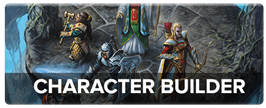
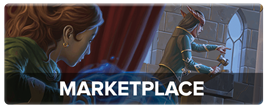

-
View User Profile
-
Send Message
Posted Dec 7, 2020Wow I had never really understood how useful this is from a creative perspective. I do love the vicious mockery cantrip (Saying "my eyes bleed when they pass in thy general vicinity" AND having monsters take damage is so fun). Honestly, next time I play a bard, it will definitely be this. Magic Initiate could be a good feat, it's like Magical Secrets but at lower levels.
-
View User Profile
-
Send Message
Posted Dec 7, 2020This is the Bard subclass I've always wanted, but mine is flavored as a painter rather than a singer, a la Okami
-
View User Profile
-
Send Message
Posted Dec 7, 2020I wish I had Tasha"s!!!!!! I want this subclass so bad!!!!!!!!!!!!!!!!!!!!!!!!!!!!!!!!!!!!!!!!!!!!!!!!!!!!!!!!
-
View User Profile
-
Send Message
Posted Dec 7, 2020I thought of a Creation bard themed after dust- like, “everything rose from the dust, and to the dust, all will eventually return”- with College Of Creation (creating objects from the dust) as well as Disintegrate (“return to dust!”). I haven’t used it yet, though, so you’re free to try that.
-
View User Profile
-
Send Message
Posted Dec 7, 2020"But most incredible of all, once you reach 14th level, you are no longer restricted by cost on how valuable an item you can create with your Performance of Creation, meaning that you can conjure expensive material components for spells out of thin air. A jeweled bowl for heroes’ feast? Free. A diamond for resurrection? On the house. You get the picture."
Ah; I didn't cotton on to this, I thought it was just mundane gear all the way! I'm always drawn to spellcasters who can make True Resurrection viable - as such a compelling story hook (e.g. a long-dead true love) - and College of Creation bard might now be top of that list.
-
View User Profile
-
Send Message
Posted Dec 7, 2020Yeah, I agree! It's so cool!
-
View User Profile
-
Send Message
Posted Dec 7, 2020I love the idea of creating disguises out of thin air, with different identities and outfits for every situation. This would be especially appropriate for a changeling, turning into a gruff dwarven singer to make friends in a bar, a flamboyant swashbuckling elf in battle, and a giggling, carefree gnome while traveling, or other different "disguises". Also, why isn't there anything on how this would make an awesome artificer multiclass? I know you couldn't give them infusions, but the ability to create objects out of thin air seems pretty appropriate for an artificer. Are there any multiclasses with this that are mechanically good rather than just good for roleplaying? I usually only care about the RP aspect, but just wondering...
-
View User Profile
-
Send Message
Posted Dec 8, 2020My favorite idea is to create 5 vials of purple worm poison. Normally worth 2000 GP per vial, now the first 5 per day are free and if you run out you can get 5 more for a 2nd level spell!
Pair with the poisoner feat, and for a bonus action you can cause an attack to do an extra 12d6 poison damage every round for 5 rounds!
-
View User Profile
-
Send Message
Posted Dec 8, 2020I've been harsh with your earlier articles, but I've got no notes on this one. A great representation of this subclass and it's potential.
-
View User Profile
-
Send Message
Posted Dec 8, 2020Excellent article. I'd seriously overlooked how cool this subclass was.
How would folks rule created items being used for Fabricate? Would the items still disappear as usual? Or for creating the components for say Imprisonment, what happens to the (spell/target)
Regardless it's an amazing feature for expensive components that are normally consumed.
-
View User Profile
-
Send Message
Posted Dec 8, 2020On Beyond you can purchase just a subclass for like $2 instead of buying the book. It’ll also discount the book and other purchase options if you later want to get more things from it.
-
View User Profile
-
Send Message
Posted Dec 8, 2020Oooh, I better start thinking of a character that will take this class. :)
-
View User Profile
-
Send Message
Posted Dec 8, 2020Okay, so, I may need more of this buddy cop puppet show opera dynamic thing with the two dragonborn. Also, this is a really fun subclass! It's very festive.
-
View User Profile
-
Send Message
Posted Dec 8, 2020This subclass is so full of countless opportunities for craziness, being able to create pretty much any non-magical item with no cost restrictions (at level 14). I've already started thinking of endless ways to really use this subclass's abilities to their full potential. This is one of my new favorite subclasses!
-
View User Profile
-
Send Message
Posted Dec 11, 2020Looks real good!, wish i could afford any of it though... can't share the same amount of creativity you guys have.
-
View User Profile
-
Send Message
Posted Dec 12, 2020he everyon introduce my name elaina/eraina sama so naice to meet everyone
-
View User Profile
-
Send Message
Posted Dec 12, 2020this game is so great
-
View User Profile
-
Send Message
Posted Dec 12, 2020Great article!!! I really wanna play this subclass soon, I love bards. Btw there's a typo in Feats under Inspiring Leader, you wrote "Your well-spoken" instead of "You're well-spoken". And once again, awesome article! I love all these new subclasses from Tasha's.
-
View User Profile
-
Send Message
Posted Dec 12, 2020You can also buy it individually for about 3 dollars
-
View User Profile
-
Send Message
Posted Dec 13, 2020i am a new player i want to learn how to play d and d properly and yt is too long and not understanding